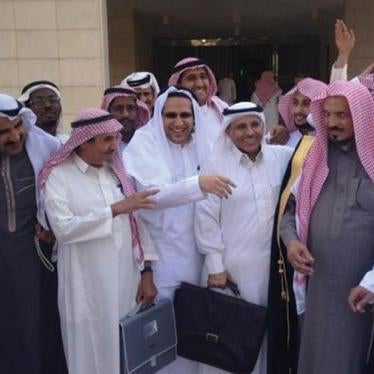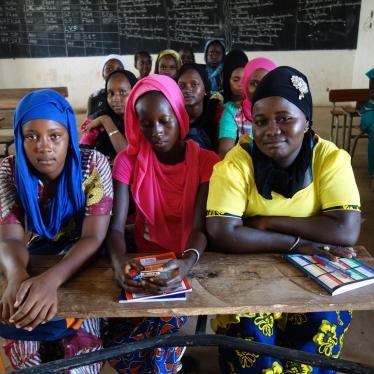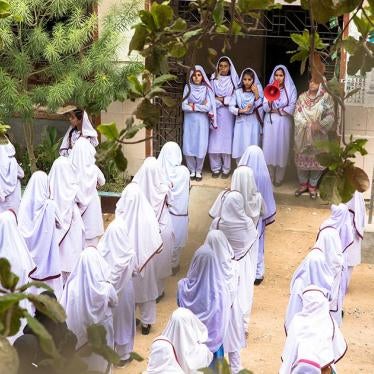Excellency,
As civil society from around the world we express support for those struggling for a future in Egypt based on human rights and democracy. At this critical juncture in Egypt’s history, at a time when peaceful political activists, human rights defenders and all forms of independent media in Egypt are under attack, we write to urge your delegation to work with other members and observer states of the United Nations Human Rights Council (HRC) to address the grave situation of human rights in Egypt at the upcoming 25th Session of the UN HRC. We believe that the serious and rapid deterioration of the human rights situation in Egypt requires the HRC to take a principled position of addressing this situation now, through the adoption of a resolution on Egypt.
According to Egyptian and international human rights organizations, repression in the country has reached levels unprecedented since the 2011 uprising. The security forces have embarked on a severe and comprehensive crackdown against persons who have dared to publicly criticize the military-backed government, including members of the Muslim Brotherhood, supporters of deposed president Mohamed Morsi, as well as pro-democracy and human rights movement activists within the country.
The current human rights situation is characterized by repeated excessive use of force, including lethal force, by the security forces, leading to the death of hundreds of protesters; increasingly severe restrictions on freedom of association, freedom of assembly and freedom of expression, as well as academic freedoms; the arbitrary imprisonment of protest leaders, university students, journalists and others; and a failure to protect vulnerable groups, including minorities. Women’s rights have been particularly affected as a consequence of the current political polarization and high levels of sexual and gender-based violence has been reported. The effective participation of women in the public sphere has diminished due to continued impunity for gender-based violations. Coptic Christian communities have also faced high levels of sectarian attacks particularly after 3 July 2013.
The crackdown above has led to increasing instability within Egypt, and a rapidly deteriorating human rights situation. In this context the UN HRC, should call on the Egyptian government to respect its international human rights obligations, ensure accountability for human rights violations within the country, and act in accordance with democratic principles.
As the Human Rights Council is mandated to “address situations of violations of human rights, including gross and systematic violations,” we urge your delegation to mobilize Council action that would:
1. Condemn in the strongest terms the persistent climate of impunity and restrictions on peaceful assembly and expression, including the repeated excessive and indiscriminate use of force by Egyptian security forces against demonstrators, in violation of basic international policing standards, which has resulted in the loss of life of a large number of protesters and bystanders, including the use of “crowd control” weapons, such as tear-gas canisters, in a disproportionate or unlawful manner.
2. Condemn the rising number of attacks and bombings that have resulted in deaths among civilians and security forces, and remind the Egyptian government of their duty to protect citizens in a manner consistent with international human rights standards.
3. Urge the Egyptian government to ensure security forces act in accordance with international human rights laws and standards on the use of force, including the UN Code of Conduct for Law Enforcement Officials and the UN Basic Principles on the Use of Force and Firearms by Law Enforcement Officials, and ensure appropriate regulations on the use of “crowd control” weapons in order to ensure the safety of demonstrators.
4. Urge the Public Prosecutor to initiate investigations into the use of lethal force by security forces that has resulted in the killing of hundreds of protesters; and further ensure such investigations take into consideration relevant forensic evidence, and the investigations are safeguarded against interference and harassment from security officials.
5. Welcome the creation of a national Fact-Finding Commission by the interim President of Egypt and urge the authorities to immediately ensure (a) that prompt, independent and impartial investigations are carried out into all occurrences of killings of protesters and grave injuries regardless of their affiliation, including bystanders, demonstrators and security officers, in line with international standards, and crimes related to sectarian violence and sexual assaults on women; (b) that the findings and recommendations are made public; and (c) that those responsible are brought to justice. Also urge that the findings and recommendations of the two previous national Fact Finding Commissions created in 2011 and 2012 be made public.
6. Urge the government of Egypt to empower the current national Fact Finding Commission with a mandate that grants it independence, and the authority to access evidence and information from all government and security bodies, officials, individuals and relevant files and documents, as well as the right to summon any person including members from the ministry of interior and the military regardless of their rank or affiliation, and meet witnesses in full secrecy without interference or harassment.
7. Urge the Egyptian authorities to provide the Commission with regular updates on progress in investigations and towards accountability, and note that in the absence of tangible progress towards accountability in Egypt, the Council will consider alternative mechanisms to establish truth and accountability.
8. Further note with concern that the absence of transparent investigations and accountability to date for grave human rights violations committed in Egypt since January 2011 may necessitate an international inquiry into such violations unless meaningful accountability occurs on a national level.
9. Urge the Egyptian government to cease ongoing harassment against human rights defenders, including defamation campaigns and threats, and to “acknowledge publicly the important and legitimate role of civil society in the promotion of human rights, democracy and the rule of law.”[1]
10. Welcome the request by Interim President Adly Mansour to release all those arbitrarily detained, particularly students, without evidence proving their criminal responsibility, and urge the Egyptian authorities to immediately drop charges against and release all political prisoners, including those arrested while exercising their right to protest peacefully, and national and international media personnel arrested in the context of performing their duties as journalists.
11. Urge the Egyptian government to fulfill its obligation to ensure the basic human rights of prisoners and detainees in particular the rights concerning life and human treatment, and to allow for monitoring of the conditions of detention by independent national or international bodies.
12. Urge the Egyptian government to repeal the new protest law or amend it in line with international standards on freedom of assembly and association, including by ceasing the arrest and prosecution of demonstrators on charges of protesting without notifying the authorities and the ending the use of excessive force including lethal force against peaceful protestors.
13. Call on the government of Egypt to ensure the full and effective protection of vulnerable groups, including members of religious minorities and women.
14. Acknowledge the Government of Egypt’s cooperation in hosting the UN Office of the High Commissioner for Human Rights (OHCHR) visit in February 2014, and encourage the Government to set dates for visits by all relevant UN special procedures mandate holders, including the Working Group on Arbitrary Detention; the Special Rapporteur on torture and other cruel, inhuman, degrading treatment or punishment; and the Special Rapporteur on extrajudicial, summary or arbitrary executions.
15. Urge the Government of Egypt to cooperate with the OHCHR in technical assistance in the areas of transitional justice and legislative reform, with a view to ensuring that new laws and policies are in line with international human rights standard.
16. Note the potential need for the Human Rights Council to consider the situation in Egypt in light of ongoing crisis within the areas of human rights and democratic reform.
Several UN officials, including the High Commissioner for Human Rights, Navi Pillay, and Special Procedures of the UN Human Rights Council, have called for restraint and prompt, independent and effective investigations into human rights violations committed in Egypt. In the context of the unprecedented human cost of the last few months and the risk of further deterioration of the situation. It is increasingly important that the main UN body in charge of human rights does not fail to respond. The failure of the UN Human Rights Council to take up this crisis would greatly undermine its legitimacy and relevance, and further encourage the escalation of violence and repression in Egypt.
We thank you for your attention.
Yours sincerely,
1) Amnesty International
2) Asian Forum for Human Rights and Development (FORUM-ASIA)
3) Centro de Estudios Legales y Sociales (CELS)
4) CIVICUS—World Alliance for Citizen Participation
5) Commonwealth Human Rights Initiative (CHRI)
6) Conectas Direitos Humanos
7) Corporación Humanas
8) DIGNITY – Danish Institute Against Torture
9) East and Horn of African Human Rights Defenders Project (EHAHRDP)
10) Euro-Mediterranean Human Rights Network (EMHRN)
11) Human Rights First (HRF)
12) Human Rights Watch (HRW)
13) International Federation for Human Rights (FIDH)
14) International Service for Human Rights (ISHR)
15) Western Africa Human Rights Defenders Network (WAHRDN)
ANNEX:
BRIEFING ON THE CURRENT SITUATION IN EGYPT:
In the months following the ouster of President Morsi, police repeatedly used excessive lethal force, in some estimated resulting in the death of more than 1000 persons at various protests, and arresting thousands, including both Islamist and secular political activists. Absence of impartial judicial oversight makes it hard to determine the exact numbers of individuals killed and arrested in the context of peaceful protests.
The space for dissent has narrowed as security forces, acting with impunity, have arrested dissidents ranging from former members of parliament, to high-profile political activists and rounded up hundreds of non-violent protestors.
The new constitution, adopted after the January 2014 referendum, falls far short of international human rights standards, in particular when it comes to military trials of civilians and freedom of religion and rightsof foreign nationals. Despite the adoption of the constitution, the government has been undeterred in carrying out large scale rights violations with almost total impunity and disregard of the rule of law.
Impunity for Extrajudicial and Unlawful Killings by Security Forces
Prosecutors have failed to investigate security forces for the killing of the hundreds of protesters in July and August, with only the protestors being arrested and investigated for such incidents, including the dispersal of the Muslim Brotherhood sit-ins in Cairo, where, according to several sources, 627 protesters and 7 police died. The Office of the Public Prosecutor has yet to investigate and hold members of security forces accountable for excessive and unjustified use of lethal force; on the contrary, criminal investigations were held and hundreds were detained because of their participation in the sit-ins.
In December, the President established a Fact-Finding Committee to investigate all incidents of violence since June 30. Members of the committee are required to submit a report at the end of their six month mandate. This is a positive step. However, severe deficiencies within the mandate of the committee put in doubt the committee’s ability to carry out its task. This includes the fact there is no obligation to make the findings public; state institutions are not obliged to cooperate with the committee; the committee has not been given the right to call witnesses; and civil society has not been represented in the membership of the committee.
Mass arrests and prosecutions based on membership in a group
The police have carried out a mass arrest campaign against persons associated with the Muslim Brotherhood, rounding up the organization’s leaders, thousands of members, and perceived sympathizers. Police have detained many of the Brotherhood and Freedom and Justice Party members and scores of supporters solely for engaging in their rights to free expression, peaceful assembly, and association. Officials moved to halt the Brotherhood’s peaceful health, education, religious, and media activities. Lower-offenses courts have issued harsh sentences against Brotherhood members after speedy trials. In November, a minor offenses court sentenced 12 students to 17 years’ imprisonment for a protest on October 30.
The criminal justice system has focused on abuses committed by Mohamed Morsi’s supporters, but has ignored abuses and political violence by his opponents, as well as human rights violations by the security forces. The Prosecution has made little effort to determine individual criminal responsibility in cases where some protesters have used violence. In practice, detained protesters face a wide range of accusations, from blocking roads to attacking and killing members of the security forces. The security forces present little forensic or audio-visual evidence to substantiate the accusations, relying heavily on testimonies and police reports – a process that casts doubt on the impartiality and independence of the investigations.
In the past three months, numerous activists have been detained and arrested for protesting against newly adopted repressive legislation, campaigning for a “no” vote to the constitution and for commemorating the January 25th uprising. Throughout the past months, hundreds of students have been arrested in various protests inside universities. Courts have issued convictions against some of them and prosecutors have in most of the cases refused to allow the detained students to sit their exams while in detention.
Crackdown on dissent: Freedom of Assembly, Association and Expression
In November, the government passed a highly restrictive law which imposed prison penalties for failing to obtain permission for protests and granted the Ministry of Interior full discretion to ban every protest or assembly and forcibly disperse gatherings. In a 9 January news conference, Interior Minister Mohamed Ibrahim said that “every Friday no less than 500 to 600 get arrested…at the beginning, we used to wait for the demonstration to turn violent, but now we confront them once they congregate. When we confront them, there are some that run, but, whoever we can grab, we detain.”
Security forces have arbitrarily detained tens of journalists in the past six months and prosecutors have referred at least 20, including Aljazeera correspondents, to trial. An investigative judge referred many individuals including liberal and Islamist politicians, as well as political activists, to trial on charges of “insulting the judiciary” which carries a prison sentence. Other arrests were carried out for the possession of items bearing the logo of the Muslim Brotherhood.
After the 3rd of July state controlled media began a prolonged defamation campaign against human rights defenders and organizations, branding these actors as a threat to national security and as foreign agents. In December, the police forces raided the Egyptian Center for Economic and Social Rights (ECESR) and arrested six members. The source of funding and their activities were the main questions directed to them. The ECESR had submitted a shadow report on Egypt to the UN Committee on Economic, Social and Cultural Rights. In January 2014 the government announced the freezing of the bank accounts of 1055 charities and NGOs, alleging they were affiliated with the Muslim brotherhood.
Rights of vulnerable groups
Violence against women continued; in the public sphere the sexual harassment of women and girls remained pervasive without any serious attempt by the government to counter it. The authorities failed to adopt a new draft law on sexual violence, which has the stated aim of improving the police’s capacity to intervene and protect women from being attacked.
In the aftermath of mass attacks on churches in August, in which the government failed to protect the right to property of Christians, the authorities only investigated some cases of sectarian violence. The government failed to amend laws on the construction of churches which discriminate against Christians and which have been a source of tension that has at times escalated into sectarian violence.
[1] HRC/24/L.24







